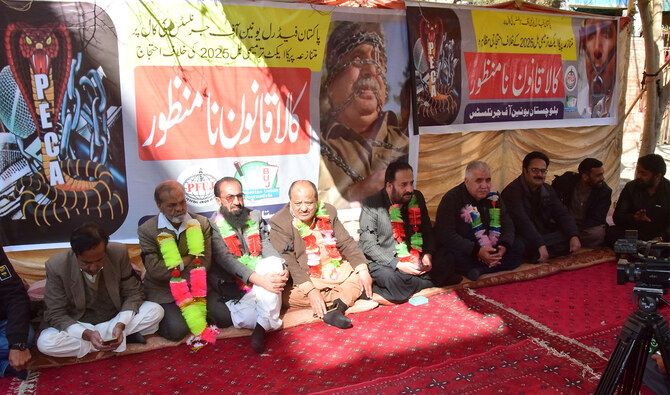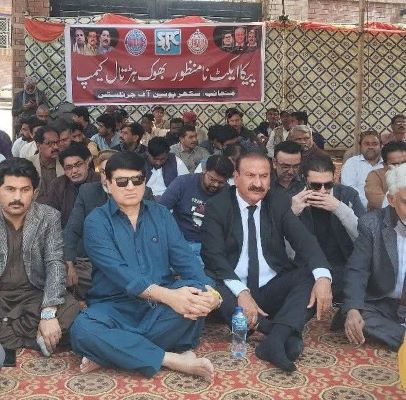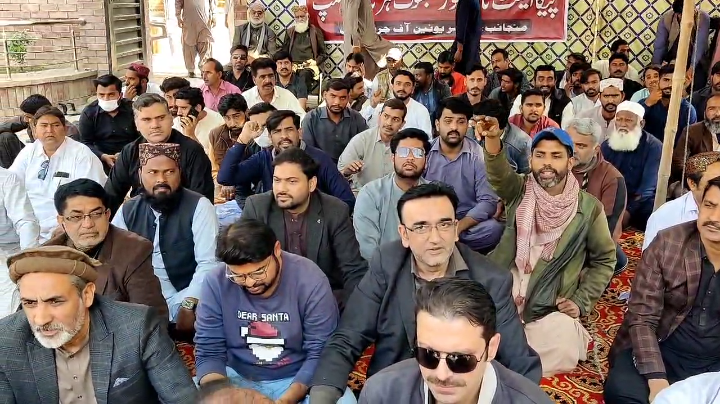Pakistan: Journalists launch nation-wide movement against ‘Prevention of Electronic Crimes’ Law

By Nasir Aijaz
The Asian Representative
ISLAMABAD: The journalist community of Pakistan have launched a nation-wide movement to lodge the protest against Prevention of Electronic Crimes (Amendment) Act 2025, known as PECA Act, passed by the country’s parliament in January this year.
After staging protest demonstrations in capital Islamabad and various other cities, the journalists have established hunger strike camps in major cities of the country including Karachi, Hyderabad, Sukkur, Quetta, Peshawar, Lahore and other big cities. The hunger strike camps have been set up outside the press clubs on the call of Pakistan Federal Union of Journalists (PFUJ). The journalists will observe the token hunger strike for three days daily from 11am to 5pm.
The social and political activists also joined the protest on February 12, the first day of token hunger strike.
The PECA Act 2025 imposes stringent penalties, including up to three years of imprisonment and a fine of two million rupees (280 Pakistan rupees are equal to one US dollar), for mistakes or unintentional acts. This vague wording has raised concerns among stakeholders, who fear it may be used to silence dissenting voices.

The National Commission on the Status of Women has also expressed concerns over the PECA Act 2025, citing its broad scope and potential to curb freedom of expression. The commission is worried that the law, which allows multiple investigating authorities to take action, may unfairly target journalists, social media influencers, and citizens.
“The journalist community, which has played a crucial role in strengthening democracy in Pakistan, is particularly vulnerable to this law. Women, who make up over 49% of the population, will also be disproportionately affected,” the Commission said in a statement.
To address these concerns, the commission urged the Minister for Law, Information, and relevant authorities to review the law and establish clear boundaries. “This will help prevent the misuse of the law while still curbing yellow journalism, fake news, and propaganda.”
The nongovernmental Human Rights Commission of Pakistan also expressed concern that the new law is “likely to become yet another means of targeting political workers, human rights defenders, journalists and dissidents by effectively penalizing criticism of state institutions.”
The Pakistan Electronic Crimes Act, (PECA) 2016, has already been used to violate rights. Dozens of journalists have been charged under its provisions.
Patricia Gossman, associate Asia director at Human Rights Watch In a statement in New York also said in a recent statement that: “The new Electronic Crimes Act will further entrench violations of free expression and internet freedoms in Pakistan.”
“Digital policing of citizens will not protect them from ‘fake news,’ but will give the authorities a weapon to punish people whose speech they don’t like,” she said.

The lawmakers say that these amendments focus on enhancing accountability, protecting digital rights, and ensuring a safer digital environment for citizens while a huge number of journalist bodies, media organizations and human rights organizations are criticizing it, calling it an attack on freedom of expression on the internet.
In January 2025, Pakistan’s Parliament passed the Prevention of Electronic Crimes (Amendment) Act 2025, (PECA Act 2025) introducing significant changes to the nation’s cybercrime legislation. This amendment aims to enhance regulatory oversight of online content and impose stricter penalties for disseminating disinformation.
The amendment proposes the creation of the Digital Rights Protection Authority (DRPA), tasked with regulating social media content, investigating violations, and blocking unlawful online material. The authority will consist of a chairperson and six members, including officials from the ministries of information and IT, as well as the Pakistan Telecommunication Authority (PTA). The Chairperson holds emergency powers to block content, subject to ratification within 48 hours.
The amendment broadens the definition of “social media platforms” to include websites, applications, and tools facilitating digital communication. This expanded scope encompasses any individual or entity operating such platforms within Pakistan.
The DRPA is empowered to regulate a wide range of content deemed unlawful, including blasphemy, hate speech, incitement to violence, obscenity, defamation, and material against the defense or security of Pakistan. The amendment introduces penalties of up to three years in prison and fines of Rs2 million for individuals found guilty of intentionally disseminating false or fake information likely to cause fear, panic, or unrest
Social media platforms may be required to register with the government, establish local offices, and appoint representatives in Pakistan. Companies will also be given deadlines to remove content flagged by the authority or face penalties.




